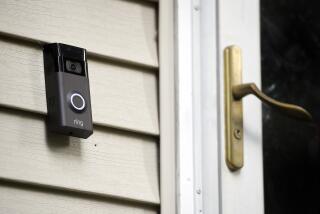Police can keep video from Ring doorbells indefinitely, adding to privacy concerns
- Share via
Once Ring doorbell owners give law enforcement access to video captured by their cameras, police can keep the video as long as they like and share it at their discretion, a Ring executive told a U.S. senator.
In response to questions submitted by Sen. Edward J. Markey (D-Mass.), the Santa Monica-based technology company also said it had considered implementing facial recognition technology in its internet-connected doorbells, but had not yet done so.
The questioning illustrates the heightened privacy concerns surrounding the company, which has already faced criticism for its partnerships with police departments and the potential implications of its video on civil liberties and cases involving racial profiling.
Law enforcement agencies can request access to user video through the company’s Neighbors portal, an extension of its social network app. They do not need to meet any “evidentiary standard” before requesting video, and if users do not want to share the video, they do not have to, Brian Huseman, Ring’s vice president of public policy, said in the letter to Markey’s office.
Police do not know the identities of the users and cannot communicate directly with them, Ring said.
But if users give law enforcement agencies access to their video, Ring does not require the agencies to delete the video after a specific amount of time. The company said that was because local record-keeping laws may require police departments to keep investigative materials.
The company also does not require departments to put any additional security measures in place to ensure the video is not breached or accessed by unauthorized parties, Huseman said. And if the video is downloaded by the requesting police officer, Ring does not have any restrictions on whom they can share it with and wouldn’t even know who else had seen the video.
“The videos may become public records subject to certain record keeping and transparency requirements,” the company said in its letter. “In addition, it is standard practice for law enforcement agencies to collaborate on investigations.”
Ring, which was acquired by Amazon last year, said in a statement that the company does not own or control users’ videos. The company also said the Neighbors portal was designed so users could decide whether they wanted to provide videos to law enforcement agencies.
As the company continues to improve its technology and look at new techniques, it said it will “continue to prioritize privacy, safety and user control.”
Internet privacy advocacy group Fight for the Future called the news an “unprecedented assault” on security and constitutionally protected rights.
“Amazon plays on people’s fears to sell them surveillance products, and then turns around and puts them and their neighbors in danger,” deputy director Evan Greer said in a statement.
More to Read
Inside the business of entertainment
The Wide Shot brings you news, analysis and insights on everything from streaming wars to production — and what it all means for the future.
You may occasionally receive promotional content from the Los Angeles Times.











